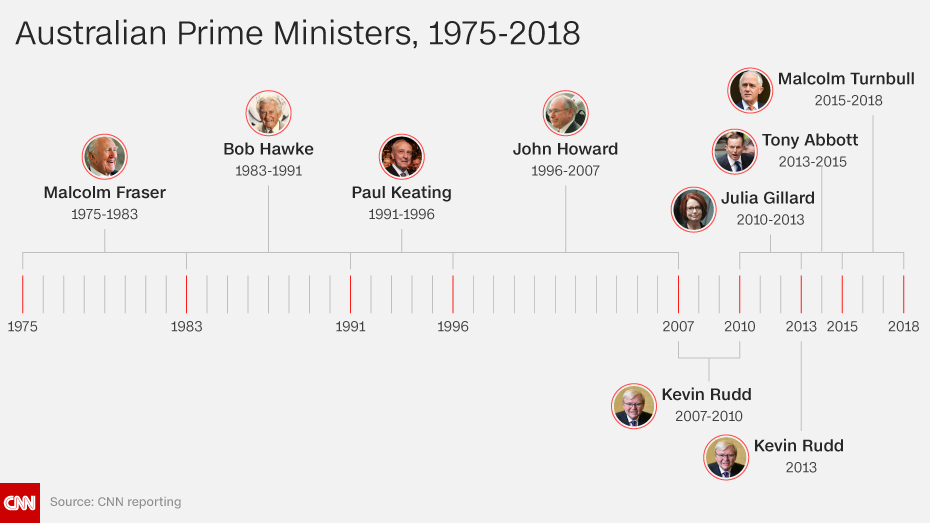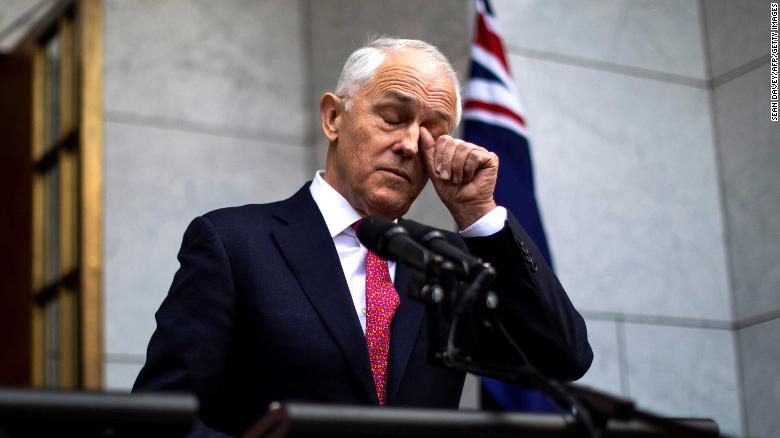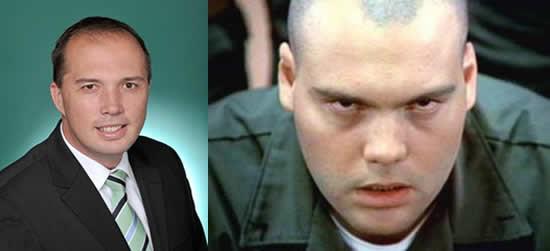Australia's sixth PM in a decade. Why does it seem so ungovernable?
By
Ben Westcott, CNN | August 25, 2018
There's never been a more exciting time to be Australian.
At least that's what Malcolm Turnbull said when he wrenched power from then-Prime Minister Tony Abbott in a leadership coup in 2015, and three years later the excitement continues as Turnbull finds himself on the receiving end of the knife.
But it wouldn't be surprising to find Australians longing for those days when their lives were a bit less exciting.
The merry-go-round of Australian political leadership pulled down another leader on Friday, making former treasurer Scott Morrison the country's sixth Prime Minister in just over a decade.
There were reports after Turnbull took power in 2015 paramedics decided to stop using the question
"Who is the Prime Minister?" to test patients' mental capacities, as it was getting too hard to remember.
So why can't Australia keep a Prime Minister for more than three years?
It isn't in economic turmoil like Italy, which struggled to form a government for months earlier in 2018, nor are the structures of government unstable, like in many failing democracies across the world.
And it certainly isn't because Australians are demanding it -- an Essential poll released on August 1 found
64% of respondents said political parties shouldn't change their leaders outside elections.
Speaking in the Australian Senate on Friday, Australian Greens leader Richard Di Natale expressed the thoughts of many Australians in an impassioned speech that went viral, describing the government was "a disgrace."
"We have people across the country who are suffering and look at what you're doing. You are so focused on yourselves that you have forgotten what the country elected you to do," he said.
Political chaos
Australia has now gone
27 years without a recession, a record of continuous growth of which dozens of other countries including the United States would be envious.
But despite that, its political culture can more often resemble that of a coup-prone banana republic.
"Our current political class is ambitious and not always willing to deal with the minutiae of intra-party politics," Jill Sheppard, lecturer at the Australian National University School of Politics and International Relations, told CNN.
"The advent of 24-hour news channels in Australia has created a demand for content, and an unprecedented focus on the personal lives and feuds of Australian politicians."
The coup culture began when Prime Minister Kevin Rudd was toppled by his deputy, Julia Gillard, in an abrupt, night time ouster in June 2010, leaving many Australians waking up unexpectedly to a new Prime Minister.
At the time, the leadership change in government outside an election was highly unusual in Australia. Before 2010, there had only been two such successful challenges in the previous 50 years, in 1971 and then 1991.
"(But) the removal of Kevin Rudd as Prime Minister in 2010 opened the floodgates: once Australian politicians realized it could be done, the notion of doing it again -- and again and again -- was less daunting," Sheppard said.
Since 2010, there have been three more changes of leadership between elections, from Gillard back to Rudd, from Abbott to Turnbull and now Turnbull to his treasurer Scott Morrison.
Following Rudd's removal from the leadership, his supporter and former Finance Minister Lindsay Tanner in disgust proclaimed that
democracy in Australia was being "dumbed down."
"Part of the problem here is that it's quite an insidious thing, that people in the game, whether they're journalists or politicians just instinctively default to politics as a sport, as if that's what matters, and overlook the content," he said in an interview in 2011.
Factional wars
It isn't just an increasingly fragile media and political environment. As in the United Kingdom and the United States, politics is becoming increasingly divided and partisan.
"Both major parties face deep-seated cleavages within their ranks, as the historical bases of the parties give way to new and dynamic social trends," Sheppard said.
"For instance, the Liberal Party was traditionally an anti-labor party, comprised of white-collar capitalists. Now the party consists of a ramshackle collective of social conservatives, social progressives, economic conservatives, and soft libertarians."
Friday's toppling of Turnbull was originally over climate change policy, but the Liberal Party's conservative faction had long disliked and distrusted the leader over his historically progressive policy views.
"There was a determined insurgency from a number of people both in the party room and backed by voices, powerful voices, in the media," Turnbull said on Friday, after he had lost.
The current leader of the opposition Labor Party, Bill Shorten, was himself a power broker for the powerful Victorian Right faction in his party before he came to power. He was personally involved in the wrangling over the Rudd and Gillard spills in 2010 and 2013.
Like other Western countries around the world, there is no current end in sight for the growing partisanship and a compulsory voting system doesn't help either, Sheppard said.
"We will all keep turning up to vote no matter how poorly our politicians behave. The two major parties lose some votes to minor party and independent candidates, but for the most part they retain their power over the political system," she said.
https://edition.cnn.com/2018/08/24/australia/australia-leadership-chaos-politics-intl/index.html




